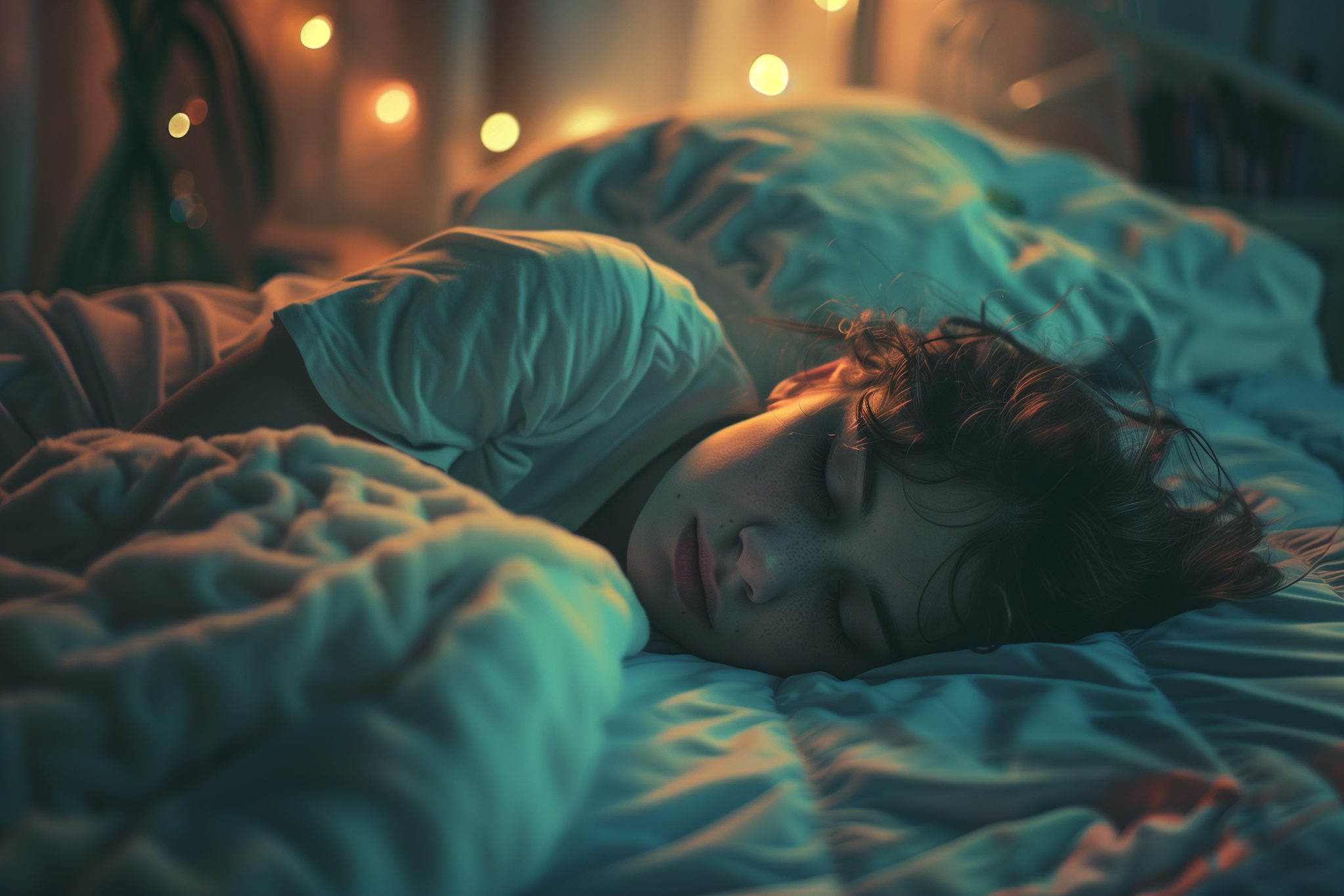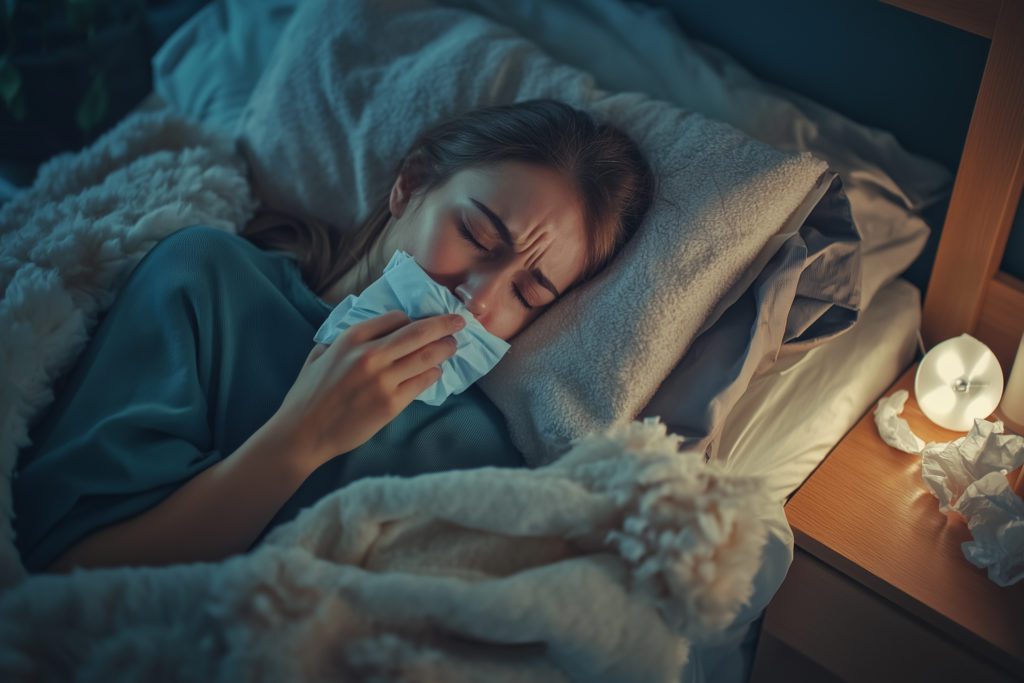
Why You're Tossing and Turning at Night? Uncovering the Causes
Uncover what may be keeping you up at night, along with actionable steps to address each problem and help you fall asleep.

It’s a stress-inducing situation to toss and turn at night, knowing that as the minutes (and sometimes hours) tick by, you’ll be even more tired come morning. You try to will yourself to sleep, then become more frustrated when that doesn’t work and you’re still lying there awake.
There can be many causes behind your tossing and turning, including overstimulation and stress, and understanding the possible reasons behind your restlessness is the first step in preventing a night of tossing and turning.
Possible Causes for Tossing and Turning All Night
Both mental and physical factors may affect how well you can fall asleep at night, so take time to go through this list and see how many of these causes you can relate to. If you think any of these causes apply to you, we’ve included some fixes you can implement immediately to help your night go smoother.
Being Stressed
Stress can eat away at your mental and physical well-being, causing symptoms that make it harder to fall asleep. Everything from tense muscles that prevent you from relaxing to stressful thoughts keeping your mind awake can make it harder to fall asleep and erode your sleep quality.
The Fix
Removing and/or addressing the stress-inducing elements of your life is a longer-term fix for reducing your stress (and one you should give attention to in order to improve your well-being).
If you can’t sleep, though, some quick fixes to reduce your stress include deep breathing (inhale for 4 counts, hold your breath for 4 counts, then exhale slowly for 4 counts; repeat until you feel calm), thinking of what you’re grateful for, writing your stressful thoughts in a journal, and thinking of something that makes you laugh.
Lack of a Sleep Schedule
If you try to sleep before your body feels tired, you will spend your time tossing and turning. Even more, if you always go to bed at different times, your body won’t know when to expect sleep, contributing to those restless nights.
The Fix
Take note of when you’re falling asleep, then move your bedtime up by 15-30 minutes each night until you’re going to bed at the time you want. Once you’re at your bedtime, stick with this schedule every day, even on weekends.
Having Anxiety
Anxious thoughts can make it hard to turn off your mind and fall asleep, but they can also make your body feel restless, which can lead to more tossing and turning. In a 2017 study, it was seen that anxiety manifesting with physical symptoms (e.g., abdominal pain, chest pain, dizziness, headache) can significantly bring down your sleep quality.
The Fix
There are a few things you can implement to address your anxiety, including:
- Mindful meditation
- Progressive muscle relaxation: tense a body part, then relax it, working from your toes up
- Breathing exercises: try the 4-7-8 method. Inhale for 4 counts through your nose, hold it for 7 counts, then exhale for 8 counts through your mouth. Repeat.
- Visualize scenes where you’re relaxed and calm
Longer-term, it may be worthwhile to enquire about counseling or therapy to help you work through the anxious thoughts.
Being Overstimulated
Bright lights and loud noises can also interrupt your ability to fall asleep by stimulating your senses, causing sleep to continually evade you.
The Fix
Put aside electronics for at least one hour before bed, and if you can’t fall asleep, don’t pick up your phone. Additionally, ensure your bedroom is dark and quiet. Using a sound machine or sleep mask can help create these conditions.
Napping For Too Long
It’s common to seek out a nap if you spent the night tossing and turning, but napping for too long can mess up your sleep schedule, causing more problems. On top of that, if you nap for too long, you often wake up feeling even more tired and groggy, and then can’t fall asleep come bedtime.
The Fix
Sticking to naps of 20 minutes or less can help you get the energy and mental boost you need to power through the afternoon without hindering your ability to fall asleep at night.
Underlying Medical Conditions
There are a few medical conditions that can make it hard for you to fall asleep at night, such as insomnia, restless leg syndrome, and sleep apnea.
Insomnia is characterized by an inability to fall asleep or stay asleep. It has many causes, such as stress, poor sleep habits, or mental health disorders. Insomnia can also result from medical conditions such as chronic pain, diabetes, asthma, heart disease, and gastroesophageal reflux disease (GERD). Since those with insomnia struggle to fall asleep, they may feel tired, cranky, anxious, or depressed during the day and may struggle to pay attention or remember details.
With restless leg syndrome (RLS), you’ll have an overwhelming urge to move your legs, often because of an uncomfortable creeping, crawling, throbbing, aching, pulling, itching, or electric feeling in the legs, which is eased with movement. This is most common when your body is at rest, which is why RLS is often experienced when lying in bed.
Sleep apnea is characterized by stopping breathing during sleep, which can cause you to toss and turn. You may even wake up during the night just to toss and turn some more.
The Fix
If you suspect you can’t fall asleep because of a medical condition, visit your doctor to discuss your symptoms and concerns. They can run tests to check for the presence of a medical condition and provide treatment options.
Be Rested, Not Restless
A night spent tossing and turning can dredge up significant concerns and frustrations, especially as the amount of time until your alarm goes off gets smaller and smaller. There are many causes of tossing and turning, some of which include stress, anxiety, and overstimulation, but there are steps you can take to combat each of these causes.
To set yourself up for success each night, Pillow has resources to help you create an ideal sleep environment and prepare your mind and body for a restful night of sleep, with no tossing or turning allowed.
FAQ
Can going to bed at different times cause a hard time falling asleep?
Yes, going to bed at varying times can mess with your body's internal clock, leading to difficulty falling asleep. Establishing a consistent bedtime, even on weekends, helps regulate your sleep-wake cycle and reduces nighttime restlessness.
Is my phone use before bed causing me to toss and turn at night?
Exposure to bright screens before bedtime can overstimulate your senses and suppress melatonin production, disrupting your ability to fall asleep. Additionally, the constant stream of information from social media can overstimulate your mind, making it harder to unwind. To improve sleep, avoid electronics at least an hour before bed and create a calm, dark sleep environment.
Could stress be the reason why I'm tossing and turning?
Stress can lead to tense muscles and racing thoughts, making it difficult to relax and fall asleep. Implementing relaxation techniques such as deep breathing, journaling, or mindfulness meditation before bed can help alleviate stress and promote better sleep.
Could naps be affecting my nighttime sleep?
Long naps during the day can disrupt your natural sleep-wake cycle, making it harder to fall asleep at night. When naps are too long or taken too close to bedtime, they reduce your body's drive for sleep. To avoid this, keep naps short—ideally 20 minutes or less—and schedule them earlier in the day to ensure they don’t interfere with your nighttime rest.
Could my diet be causing me to toss and turn at night?
Yes, certain dietary habits can affect sleep quality. Consuming heavy or spicy meals close to bedtime can cause discomfort and disrupt sleep. Additionally, excessive caffeine or alcohol intake can interfere with your ability to fall and stay asleep. It's advisable to have lighter meals in the evening and limit stimulants before bedtime.
Is it normal to wake up multiple times during the night?
Brief awakenings during the night are normal; most people experience at least 20 mini-awakenings per night, such as adjusting your pillow. However, frequent and prolonged awakenings can indicate underlying issues like stress, anxiety, or sleep disorders. If you consistently have trouble returning to sleep, it may be beneficial to consult a healthcare professional.

Written by
Jessica G
Medical writer freelancer who has written hundreds of articles on varying topics. Masters of Engineering degree in Biomedical Engineering.
Download Pillow
Get help
Press & News
Legal
Connect
X (Twitter)
Company
Copyright © Neybox Digital Ltd.



